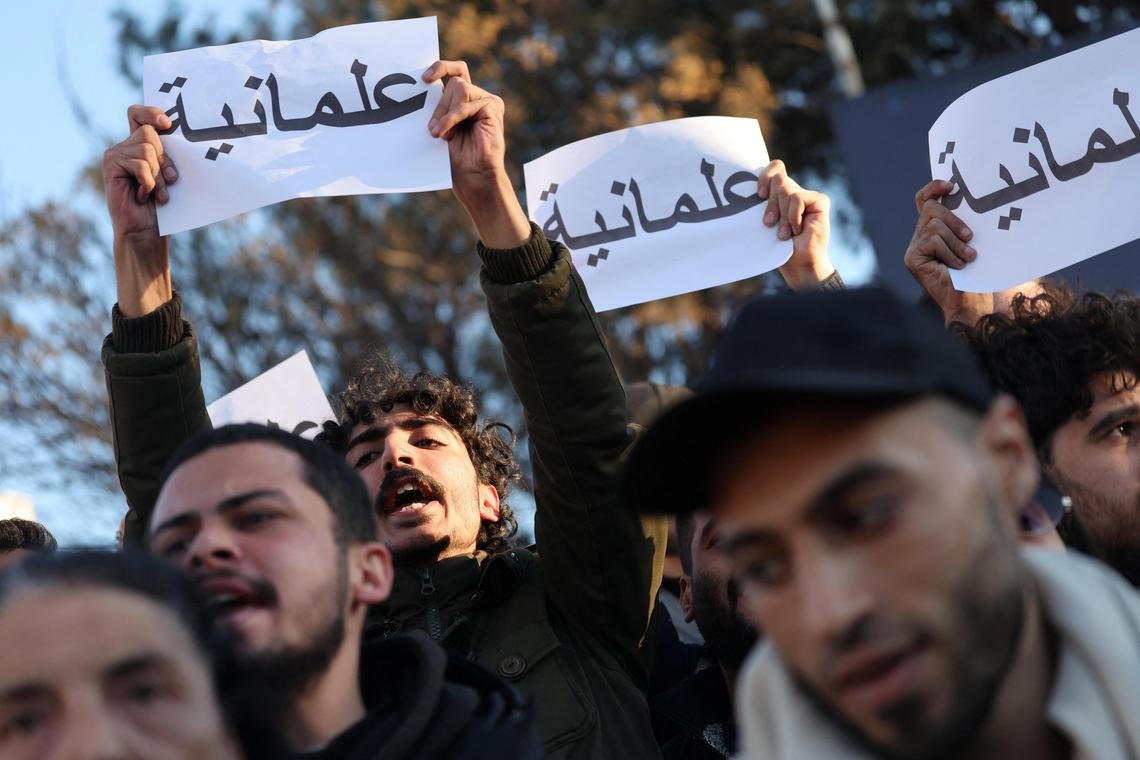DAMASCUS – US diplomats are in Syria to meet the country’s new Islamist-led rulers, the State Department said on Dec 20, as outside powers seek assurances they will be moderate and inclusive.
The ouster of former president Bashar al-Assad ended decades of abuses and years of civil war. But it has raised concerns about the rights of minorities, as well as women, and the future of the semi-autonomous Kurdish region.
On Dec 19, hundreds of demonstrators in Damascus demanded democracy and women’s rights, in the first such protest since Mr Assad’s departure.
In north-east Syria’s Qamishli, thousands demonstrated in support of a US-backed, Kurdish-led force that is under pressure from Turkey and allied rebel fighters.
The lightning offensive that forced Mr Assad’s departure was led by Hayat Tahrir al-Sham (HTS), which is rooted in Al-Qaeda’s Syria branch but has more recently adopted a moderate tone.
Still, its sudden arrival in the capital has left foreign governments scrambling for a new policy, particularly in some countries where HTS is designated a terrorist group.
US diplomats have not been to Damascus on a formal mission since the early days of the civil war that erupted after Mr Assad cracked down on anti-government protests in 2011.
They will meet representatives from HTS, which Washington deems a terrorist group, as well as activists, minority groups and civil society, the State Department said.
They will speak with Syrians about “their vision for the future of their country and how the United States can help support them”, a State Department spokesperson said.
The delegation includes the US point man on hostages, who has been seeking clues on missing Americans including journalist Austin Tice, who was kidnapped in Syria in August 2012.
The trip comes a week after Secretary of State Antony Blinken said the US had been in direct contact with HTS, as he toured Syria’s neighbours.
Kurdish fears
At talks in the Jordanian resort of Aqaba, Western and Arab powers as well as Turkey jointly called on Dec 14 for an “inclusive, non-sectarian and representative government” that respects the rights of all of Syria’s diverse communities.
That call was echoed at talks in Cairo on Dec 19 by countries including Turkey and Iran, which backed different sides in Syria’s civil war.
Iranian President Masoud Pezeshkian, whose country backed Mr Assad, called for “the participation of all (Syrian) groups in the future government… as well as respect for different beliefs and religions”.
Turkish President Recep Tayyip Erdogan, who supported the opposition to Mr Assad, called for reconciliation and restoration of Syria’s “territorial integrity and unity”.
He also urged the “establishment of a Syria free of terrorism”.
Turkey has been putting pressure on Kurdish-led fighters and said on Dec 19 that it would continue military preparations until they “disarm”.
The semi-autonomous north-eastern region of Syria is protected by the Syrian Democratic Forces, a group led by People’s Protection Units (YPG).
Turkey accuses the YPG of being a branch of the Kurdistan Workers Party, which both Washington and Ankara consider a terrorist group.
Kurdish leaders in Syria have welcomed Mr Assad’s ouster and raised the three-star independence-era rebel flag, but many in the region fear continued attacks by Turkey and allied fighters.
Several thousand people chanted “The Syrian people are one” and “No to war in our region, no to Turkey’s attack” at Dec 19’s demonstration in Qamishli.
No to religious rule
In Damascus, a diverse crowd chanted “No to religious rule” and “We want a democracy, not a religious state”.
The protest came days after a spokesman for the interim government said “female representation in ministries or parliament… is premature”, citing “biological” and other considerations.
Ms Majida Mudarres, a retired civil servant, said she is furious about the comments.
“Women have a big role in political life,” the 50-year-old added. “We will be observing any position against women and will not accept it. The time in which we were silent is over.”
Mr Assad’s departure sparked celebrations at home and abroad.
On Dec 19, UN chief Antonio Guterres said his ouster represents a “flame of hope” in a region “consumed by many fires”.
But he warned there are obstacles ahead, including continued Israeli air strikes.
These are violations of Syria’s sovereignty and territorial integrity, and they must stop, he added, ahead of a UN Security Council meeting.
He also condemned Israel for pushing its forces into a UN-run buffer zone on its border with Syria following the fall of Mr Assad.
Putin denies Syria setback
Mr Assad fled Syria for long-time backer Russia on Dec 8, and has issued only a single public statement since then.
Russian President Vladimir Putin said on Dec 19 he had not seen Mr Assad yet, adding: “I plan to, I will definitely speak with him.”
He denied that Mr Assad’s fall is a setback for Moscow.
“I assure you it is not,” he told an annual press conference.
“We came to Syria 10 years ago so that a terrorist enclave would not be created there like in Afghanistan. On the whole, we have achieved our goal,” Mr Putin said.
Russia was Mr Assad’s key backer in a civil war that killed more than 500,000 people and sparked the exodus of millions of refugees.
Since his departure, rebels have thrown open prisons where tens of thousands of people were arbitrarily detained and tortured.
They have located mass graves believed to hold some of the estimated 100,000 people who died or were killed in custody since 2011. AFP
Join ST’s Telegram channel and get the latest breaking news delivered to you.
